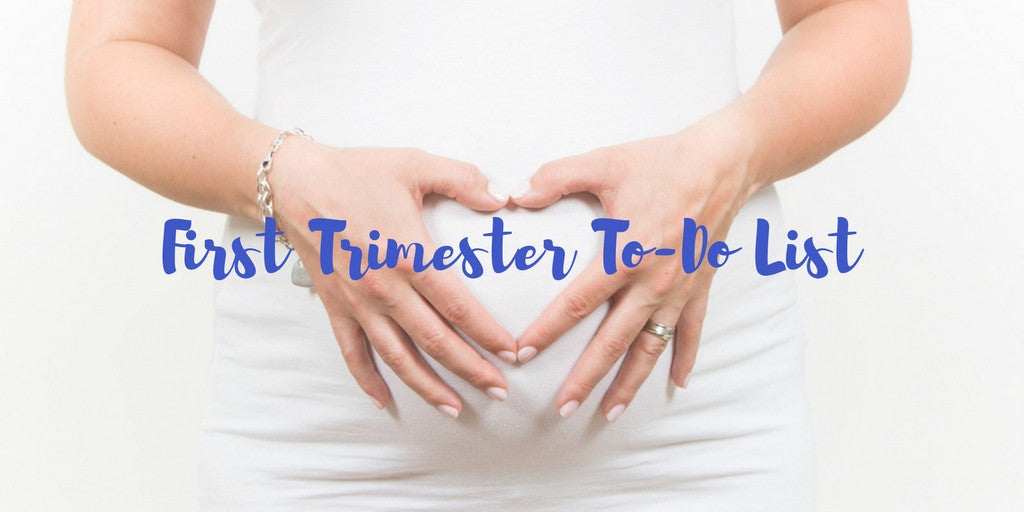First Trimester To-Do List
You’ve just taken a pregnancy test and saw that little “+” or smiley face or “Pregnant” or whatever symbol happens to correspond with your test of choice, and you are likely now thinking about what the first trimester holds for you. Here are some things you should be preparing for, thinking about, or doing right now::
- Choosing a healthcare provider. There are lots of OBGYNs, Midwives, and PCPs to explore, but ultimately you want to make sure that the caregiver you go with really resonates with your birth plan and beliefs about pregnancy and childbirth. Finding a provider who you really connect with will make all of the difference in your pregnancy and delivery experience since you are not only looking to them for physical care, information and guidance, but for emotional support as well. And since we’re on the subject of choosing a healthcare provider, you will also want to...
- Figure out how you are going to pay your provider. Most of us have health insurance already, but the amount of coverage that each individual has will vary greatly. If you want a midwife instead of an OBGYN, you’ll want to see if your insurance covers midwifery care. If it doesn’t, you’ll need to figure out how much it will cost you out-of-pocket, and whether or not you can afford it. This is something you are not going to want to deal with later on in your pregnancy, so it’s best to get it out of the way first.
- Check in on your health and eating habits. If you have been smoking, drinking in excess, getting too little exercise, and/or eating a poor diet, now is the time to really take a look at these habits and make improvements that will benefit your and your baby’s health. Smoking and excessive alcohol consumption can have detrimental effects on your developing baby. Poor diet can lead to pregnancy complications, and may also - in more severe cases - prevent your growing baby from receiving all of the nutrients, vitamins, and minerals needed for healthy brain and organ development. See what you can do to make even a few small changes that can have a big effect on your and your baby’s health.
- Take an inventory of your regular daily activities to ensure that they are safe for pregnancy. When I got pregnant in 2009 I was working for a commercial cleaning company. Every day I was surrounded by hazardous chemicals that weren’t really safe for pregnant women to work around. I quit within the first trimester due more to extreme fatigue than chemical exposure, but that was definitely a factor in my decision to leave. If need be, check in with your caregiver if you aren’t sure whether or not a specific activity is safe or not.
- Find ways to relieve early pregnancy symptoms if you are experiencing them. One of the most common complaints is morning sickness. If you are able to build up your magnesium and Vitamin D stores at least 6 months before you get pregnant, your chances of morning sickness will decrease greatly. If you haven’t prepared, however, you may still be able to find relief through the use of various products and/or supplements: Ginger, sea-bands, eating small meals sufficient in protein throughout the day, or - in extreme cases - prescription anti-nausea medication may all help. Be gentle with yourself and if you aren’t feeling well, take time to rest and nurture your body.
- REST. For many pregnant women, exhaustion comes on hard and fast during the first trimester. If you are able you should make it a point to rest as much as you can so you aren’t dragging all day long. I know this can be challenging for those who work full time or have other children to tend to, but even if you have to take a cat-nap at work, or lay down with your other littles during their nap time, this can make a big difference in how you feel in general from day to day. Go to bed early if you can! Your body is doing incredible things, and it’s only natural to feel some exhaustion because of it.
- Try to get adequate exercise. This doesn’t mean that you have to do a bunch of cardio or weight training, but you do want to keep your body supple and your blood and oxygen flowing. When it comes time to deliver your baby, you want to make sure that you are able to meet the physical challenges that the experience may require of you. Having hip and leg flexibility and the ability to exert yourself for long periods of time can be most helpful when the time comes. Not only that, but exercising helps to cut down on fatigue and it just feels good!
- Learn to distinguish between normal pregnancy symptoms and symptoms that may require caregiver notification. Especially if you are pregnant for the first time, it can be hard to tell whether a particular ache, pain, or sensation is normal, or if it requires immediate attention. Talk with your caregiver at your first appointment and do your own research so you’ll be better informed in the event that something doesn’t feel right.
- Do fun pregnancy stuff! Think about names, track your baby’s growth, start looking at baby clothes and nursery items, begin building a registry, etc etc etc.
During the challenging parts of the First Trimester, it’s always a good idea to throw some relaxing and fun things in there for good measure. Oh, and here’s a tip: use http://babyli.st/ to set up your registry. You can add items from anywhere on the internet, regardless of whether or not a particular store actually has a baby registry tool!


